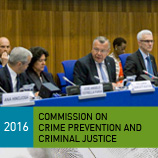 23 May 2016 - Trafficking in cultural property is used to launder the proceeds of crime, and is an acknowledged source of terrorist financing. Recent events in Syria and Iraq have also shown the extreme vulnerability of historic sites to deliberate destruction that undermines a common heritage.
23 May 2016 - Trafficking in cultural property is used to launder the proceeds of crime, and is an acknowledged source of terrorist financing. Recent events in Syria and Iraq have also shown the extreme vulnerability of historic sites to deliberate destruction that undermines a common heritage.
Recognizing the importance of these issues, UNODC, with the assistance of Italy, today launched an innovative and creative tool to assist national bodies, law enforcement authorities, practitioners and policymakers working in the field of cultural property at a side event on the global threat of trafficking in cultural property.
The event brought together high profile speakers including the Executive Director of UNODC, Yury Fedotov, the Italian Undersecretary of State at the Ministry of Cultural Heritage, Ilaria Borletti Buitoni, the Secretary General of INTERPOL, Juergen Stock, the Secretary General of the International Institute for the Unification of Private Law, José Angelo Estrella Faria, as well as the Assistant Director-General for Culture of the UN Educational, Scientific and Cultural Organization, Francesco Bandarin, and the Director of Compliance and Facilitation of the World Customs Organization, Ana Hinojosa.
"Political instability; corruption; lack of resources to control borders; and weaknesses in domestic procedures for the effective criminalization of illicit trade, seizure, confiscation and return of cultural property are some of the main challenges we face in the area of trafficking in cultural property," said Mr. Fedotov.
The Practical Assistance Tool is designed to assist in the implementation of guidelines on criminal prevention and criminal justice responses to trafficking in cultural property adopted in a resolution by the General Assembly.
The Guidelines focus on three thematic areas for a national policy on cultural property, namely prevention strategies, criminal justice policies and international cooperation to ensure the return, and restitution of cultural property.
Just as importantly the guidelines are based on principles and standards found in relevant international legal instruments, including the United Nations Convention against Transnational Organized Crime, as well as current practices and initiatives in several countries in addressing the problem of trafficking in cultural property.
UNODC Executive Director's remarks at the event
25th Session of the Commission on Crime Prevention and Criminal Justice (CCPCJ)